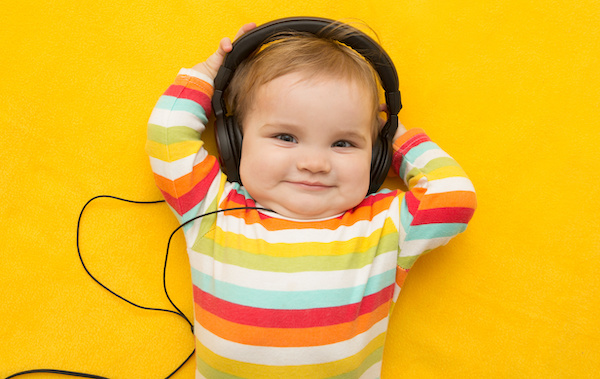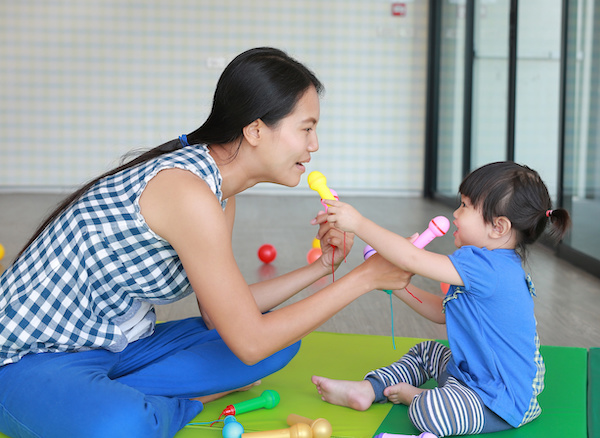It’s natural for anyone who holds a baby to start singing as a way of soothing them. And in all likelihood, most kids will stop crying almost instantly and listen to the music.
But why is that so? Do babies love music that much really? Put in another way, do they even know what a song is?
The short answer is, yes- babies know when you are singing to them and they actually respond to music with enthusiasm just as we do. This is because an infant’s brain is prewired with the capacity to appreciate singing. Actually, researchers have found out that infants can recognize rhythmic patterns as early as their first day after birth.
And what might surprise you more is that they have innate sensitivities too. Just like you, your baby prefers a song with intervals that feel pleasant and agreeable (consonance) as opposed to those with an impression of clash and tension (dissonance).
The best bit, however, is that the infant won’t critique you regardless of your choice of song and terrible voice. Provided you can sing in a conversational style, with lots of repetition, high pitch, slow tempo, and with a loving tone, then you are ready to rock your baby world!

| Be well prepared for your newborn baby arrival! Choose the best stroller and infant car seat combo for your child to always keep them safe and happy. |
Effects Of Mother-Infant Singing On Bonding & Baby Development: Research Study Results
There are hundreds of studies around this subject and they all tend to point towards a very strong correlation between music and an infant’s development.
In one particular study recently published on Sage Journals, the researchers wanted to determine the effects that mother-infant singing has on stress hormones, emotional closeness, anxiety, and affect.
This study comprised of 43 mothers living in Greater London and with babies 3-14 months old. All the moms were non-smokers, were not on steroidal medication, and had a sufficient level of English for informed consent.
In addition, all the mothers in this study reported being averagely confident when singing to the baby. Precisely, on a scale of 1-10 (1 representing not at all confident and 10 being very confident), the average score was 6.4.
How The Study Was Carried Out
The study team was divided into 2 major groups one that made the experimental singing condition while the other made the comparison condition. The 2 groups were then taken through separate workshops. However, they were led by the same leader from the Royal College of Music and who tried to ensure an equal level of interaction between the 2 groups.
In the experimental group, the workshop began with a short song that was meant to introduce the mom and baby to each other. This was followed by musical games which were basically simple melodic vocal patterns.
After the games, the mothers were taught simple calming songs which they sang to the babies together as a group while playing the shaker and hand-chimes. This was followed by a short closing song.
The comparison group workshop, on the other hand, kicked off with a short non-music circle activity that aimed at introducing the mother and the baby to each other.
The next activity involved simple non-melodic vocal exercises between the moms and babies followed by talking and playing with the babies and other moms in the group. This play was assisted by a couple of sensory objects selected by the leader such as scarves and rattles. The workshop was lastly closed with a round circle goodbye.
Collection Of Data
The data was collected by 3 researchers and this included taking saliva that would later be used to measure endocrine response as a measure of stress and anxiety.

Results
The first research question aimed at determining how infant-directed music affects emotional closeness, anxiety, and affect in mothers.
Comparing the biological and physiological responses between the 2 groups showed an incredibly greater mother-infant closeness in the experimental (singing) compared to the comparison group.
However, the comparison group had a higher mother-to-mother closeness compared to the singing group.
With regard to affect, the results showed that although singing didn’t alter the degree of positive affect to a greater extent, the small increase that it made resulted to a significant difference compared to the small decrease in positive affect that was noted in the comparison group.
Interestingly, negative affect decreased by a significant level in the singing group compared to the comparison condition.
There wasn’t a significant decrease in anxiety in the 2 conditions, though. All in all, the experiment condition had a marginally greater decrease than the non-singing group.
With regard to stress, the study showed a significant decrease in the level of cortisol in the experimental condition compared to the comparison condition.
Discussion
The major finding that stood out from this study was that mother-infant singing increases the closeness between the two much better than just playing and talking with the baby.
Another finding of this study was that although both singing and talking and playing with the baby does help in reducing negative affect, singing increases positive affect to a significantly higher level, and also leads to a greater decrease in negative affect.
As far as anxiety is concerned, the researchers noted a reduction in anxiety levels among mothers who sang for their baby although the difference wasn’t so big compared to that of the comparison group.
However, the mothers in the singing group recorded a significant decrease in the stress hormone cortisol. This is usually a common finding in most studies around this subject.
Other external researchers explain that the reduction in cortisol levels is caused by the fact that social bonding helps in reducing Hypothalamic Pituitary Adrenal (HPA) axis activity- which produces the cortisol hormone (increased HPA axis activity leads to increased production of cortisol hormones. Vice versa is true).
This study also shows a correlation between mother-infant closeness and changes in anxiety and affect. The researchers explain that this hints to the existence of strong pathways that link closeness and psychological state.
Sound Of Music Or Act Of Singing?
Another important aspect of this subject that not most studies haven’t dug deeply into is whether singing to the baby and listening to music do offer similar benefits.

This was one of the 2 major aims of this study conducted by researchers from the Imperial College, Faculty of Medicine and Center for Performance Science, Royal College of Music. The second aim was to determine whether there exists an association between singing to the baby and maternal health.
This study had a total of 2,306 women who were living in England throughout their last trimester of pregnancy and 9 months after birth.
The major finding that this study revealed was that singing to the baby daily leads to reduced symptoms of postnatal depression. It also expressed a higher level of perceived mother-infant bond and increased wellbeing and self-esteem.
Being more precise, this study found that when mothers with postnatal depression sang for their babies daily through a 5-week singing program, it led to an increase in mother-baby intersubjectivity (a stronger relationship between the two) as well as improved maternal self-efficacy (self-belief in taking good care of the baby).
An important finding of this study was that while listening to music also helped in enhancing mental health and wellbeing, the effects were lessened by the inclusion of other creative engagement activities.
The researchers, therefore, suggest that the postnatal mental health and wellbeing could be associated directly to the physical act of the mother singing daily to the baby. They also link singing- and not listening to music- to the increased positive affect and decreased negative affect.
Other researchers cited in this study actually suggest that the benefits of singing to the baby are attributable to a combination of 4 major factors; the music itself, the mother’s physical act of singing, the social engagement, and the baby’s personal response to the song.
Benefits Of Singing To The Baby
In addition to strengthened social bonds that the act of singing to the baby offers, there are lots of other benefits for the baby.
Minimal Neonatal Crying Episodes
A study published in Elsevier found out that in addition to postnatal bonding, children in the singing group had much lower crying episodes during the first and second months. In addition, the researchers noted that these babies also had reduced infantile colic and neonatal nightly awakening too.

Grow Their Word Bank
Singing has been found to be a great way of adding new vocabulary to the baby’s list of words. While she may not decipher most words instantly, holding something, for instance, a toy while singing enables the baby to associate those words with the toy.
Learn A Language
Language by itself is musical; it has rhythm and rhyme – just as music. Therefore, it goes without saying that singing not only teaches them new words, but it also enhances their rhymes and rhythms.
Grow Their Math Skill
Advanced mathematical skills highly depend on early music skills. The good thing is that most babies’ songs are full of additions and subtraction and, therefore, help the babies to jumpstart on the mathematical concepts that await them in school.
Exercising Their Memory Muscle
Another huge benefit of singing for infants is the repeated use of their memory muscle. This has been found to go a long way in increasing the ability of the child to learn pieces of information in areas that they normally struggle.
Bibliography:
Other sources:
https://www.sciencedirect.com/science/article/pii/S1871519217300367
https://voices.no/index.php/voices/article/view/1650/1410
Please keep in mind that this article IS NOT a medical advice. The purpose of this article is informative and it’s not a substitute for consultation with a doctor. Always consult your health concerns and decisions with your doctor.

